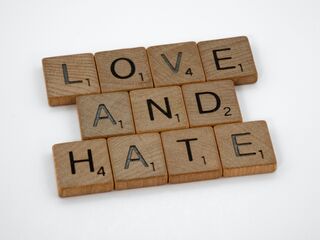Mating
When Sexual Attraction and Hate Collide
5 reasons why you may experience sexual attraction and hate simultaneously.
Posted September 22, 2021 Reviewed by Chloe Williams
Key points
- Simultaneously feeling attraction and hate often stems from transferring a feeling one has for one person onto another.
- Attraction fused with hate may be fueled by fears of rejection, past relationship trauma, social competition, or other insecurities.
- Understanding emotional responses can help people break free of unhealthy relationship patterns and make better choices.

First impressions are powerful. The moment you come into contact with someone, you may have any number of responses: You may instantly like or dislike them, feel annoyed by them, or feel drawn to them. This list is seemingly endless.
To complicate matters, sometimes powerful emotions collide. You may find yourself hating someone while feeling attracted to them at the same time; such cognitive dissonance can pack quite a punch.
When hate and attraction collide, how do you know which feeling to trust?
The origin of hate in attraction
If you find yourself hating someone you’re attracted to, the conflict will likely spring from your history, particularly past intimate relationships with family, friends, colleagues, or lovers.
When someone hurts you, that hurt lives inside you. The more painful the experience, the more likely you will transfer those feelings onto others. This psychological defense is known as “transference” — transferring a feeling you have for one person onto another.
The less you know about someone, the more vulnerable you are to transference reactions, which have the potential to distort reality and color your view of relationships.
For instance, I worked with a patient whose girlfriend in high school hurt him deeply. Unsurprisingly, as an adult, he tended to distance himself from women he found attractive and developed a resistance to intimacy. He carried that bitter experience from his childhood into his adult relationships and transferred the feeling of hurt onto women that he found attractive. Avoiding relationships kept him from being hurt again, but left him lonely.
Another patient confessed that she viewed all men as potential abusers. Her history of trauma started with her abusive father and led to relationships with abusive men; who could blame her considering men with distrust?
Why you may hate someone you find attractive
If you feel attraction and hate simultaneously, chances are there’s an underlying discomfort you’re not acknowledging. Rather than exploring the true source of your discomfort, you may blame the other person for it, hate them or avoid them entirely. Here are some possible reasons why you may hate people you feel attracted to:
1. You fear rejection. You’re afraid that the other person will reject you, so you reject them first, a preemptive strike to avoid the anticipated hurt of being turned down.
2. You distrust your attraction because of past trauma. Trauma has a powerful effect on how we experience others. Trusting an unknown person is a real challenge for a person who has experienced a hurtful relationship or suffered childhood trauma.
3. You don’t want to suffer again. If your last intimate relationship ended badly, you’re likely to feel skeptical of new people that you find attractive. You may keep your distance or even treat them coldly. We tend to protect areas of our body that have been wounded. It is the same with feelings of vulnerability.
4. You feel insecure about your appearance. Sometimes when people feel an attraction to someone, they have the impulse to run and hide. They may feel shy, overwhelmed, or angry at the person for “making them” feel so uncomfortable. At the core of the conflict are social insecurity and low self-esteem.
5. You think attractive people are arrogant and feel superior. I’ve worked with several fashion models who reported that they frequently experience hostility from strangers. Such reactions may spring from people feeling competitive with them or jealous of the attention that they are receiving.
Breaking Free of Transference
It’s natural to have transference reactions to others based on your history, but you don't have to be stranded there. Cycling through the same negative transference reactions doesn’t promote growth or leave you feeling good about yourself.
The key to breaking free of transference lies in examining and understanding your emotional responses to others. By understanding the origins of reactions, you can make empowered choices and break free of negative relationship patterns.
While individual therapy can help you to unravel your transference reactions and understand your history, group therapy is far more effective at helping you to navigate intimate relationships, set healthy boundaries, and remain true to your authentic self.
To find a therapist, please visit the Psychology Today Therapy Directory.




